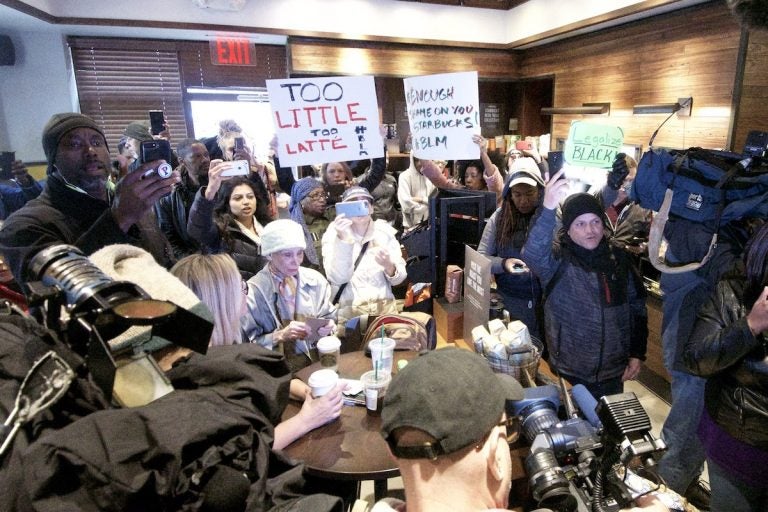Not everyone is sold on Starbucks’ new loitering policy
Starbucks changed its policy to explicitly say people don't need to buy something to use the bathroom or sit. It's not winning much support.

People gather at a Starbucks on 18th and Spruce streets in Philadelphia to protest Thursday's controversial arrests of two black men at the store. (Bastiaan Slabbers/for WHYY)
Starbucks has announced it would no longer require purchases for people to use the bathroom or sit in their cafes. The announcement came five weeks after the controversial arrest of two black men who were waiting to meet someone in a Center City Starbucks without making a purchase.
The policy is designed to create “a culture of warmth and belonging where everyone is welcome” but Philadelphians are still skeptical.
Steve Waltz, of Center City, called the policy a “band-aid over a bullet wound.” He says systemic racism is the real issue.
“It’ll help Starbucks because it’s good [public relations],” he said, “but will it help us in institutions that are not Starbucks like the government, the justice system?”
Before the new policy, the company left the decision of whether a person could sit or use the bathroom up to store managers. However, Starbucks executives said that approach was “loose and ambiguous.”
John Stuckey, of Center City, said the new policy ought to help the coffee giant seem more inclusive and lighten the responsibility of their employees.
“I think that it’ll help at least in terms of the onus they’re putting on their own employees,” he said. “They don’t have to make that kind of decision.”
The controversial arrest kicked off a national conversation about being black in so-called white spaces. In the days that followed, both L.A. Fitness and Waffle House were among the businesses and individuals that faced scrutiny for incidents where the police were called on seemingly innocent black patrons.
And just recently, Starbucks came under fire again after an employee at a location in California printed a racial slur on a Latino man’s cup. Starbucks has since apologized.
Shani Akilah, co-founder of the Black and Brown Workers Collective, who were among protesters at the Center City Starbucks in the days following the arrest, said this and the April incident are indicative of a larger cultural issue within the company and a simple policy change isn’t enough.
“They need to do the heavy lifting work and I don’t believe that’s the heavy lifting work,” said Akilah. “That’s a start, but they need to work on training their internal workers around understanding anti-oppression training. Doing things to understand impacts of white supremacy on space, particularly business space.”
The policy precedes the May 29th day of training when Starbucks will close all of its stores —over 8,000 — for a mandatory anti-racial bias training for all of its employees.
Asa Khalif, another one of the activists who protested Starbucks in April, said the company’s efforts are a step in the right direction. His main concern, however, is whether they’ll continue implementing anti-bias practices.
He said he would like to see transparency and progress around not only their training, but their hiring and promoting practices also.
“There definitely needs to be a beginning a middle and a follow up,” Khalif said. “I want to know exactly what that the plan is and how that will be implemented moving forward… If you’re going to have a conversation about bias, it cannot just end with one day of training and then go back to business as usual.”
WHYY is your source for fact-based, in-depth journalism and information. As a nonprofit organization, we rely on financial support from readers like you. Please give today.





